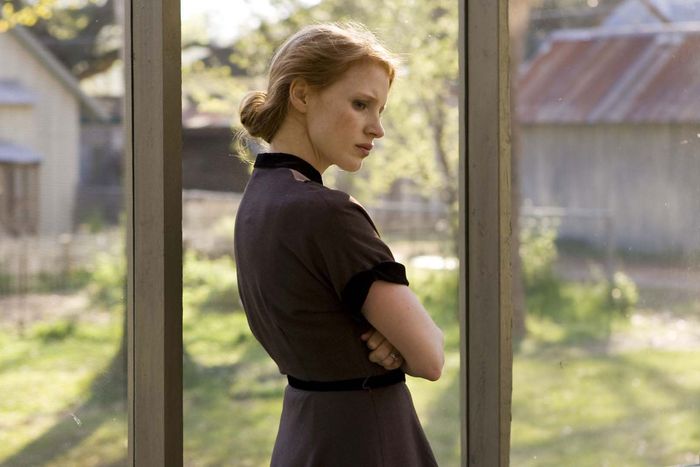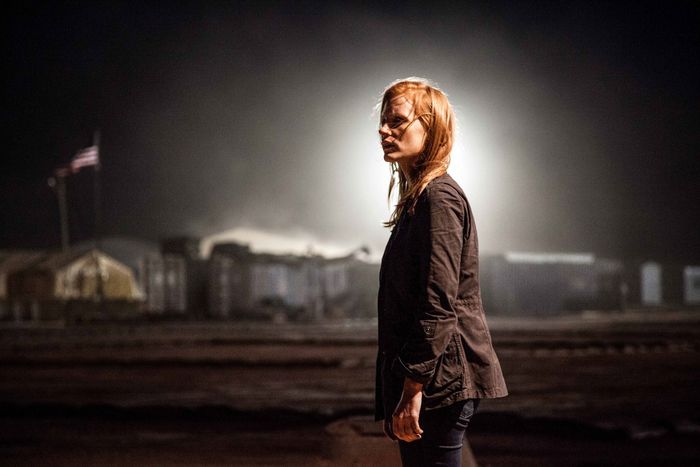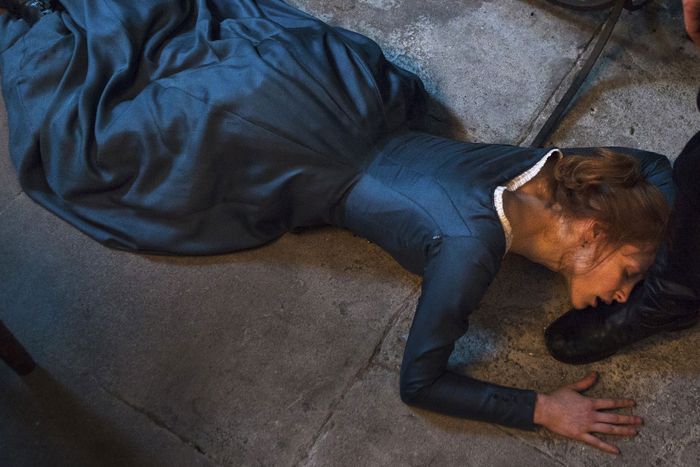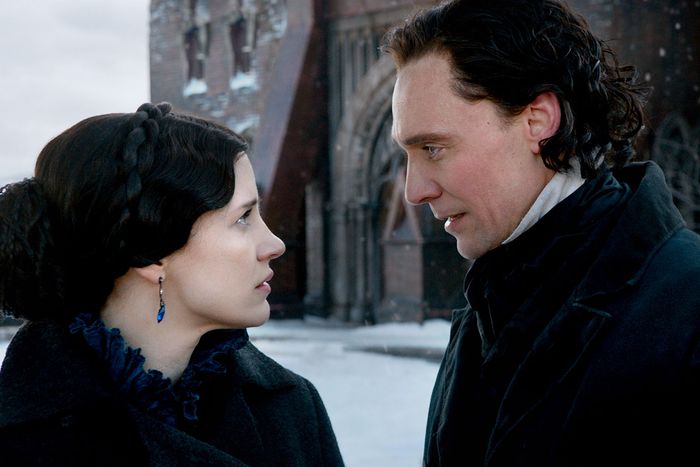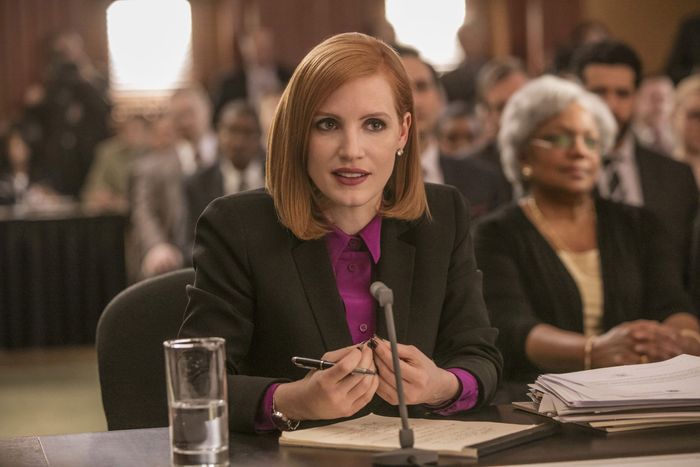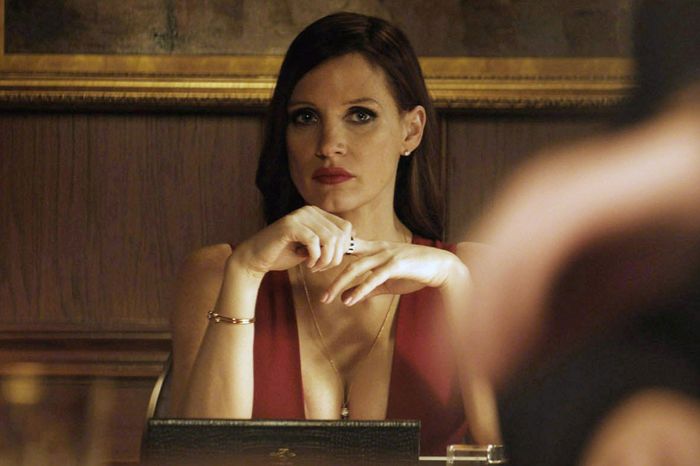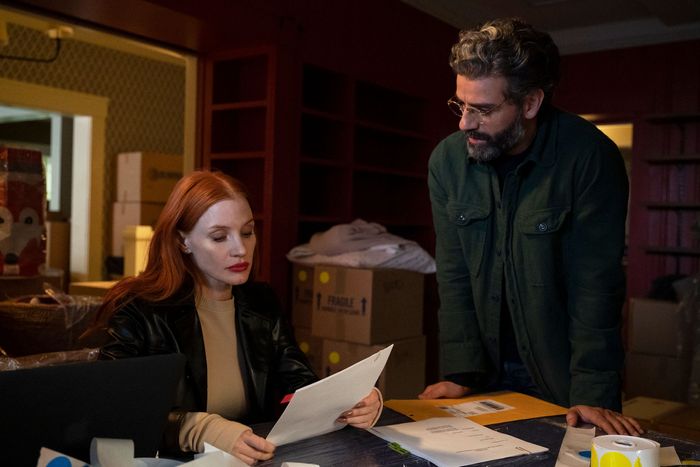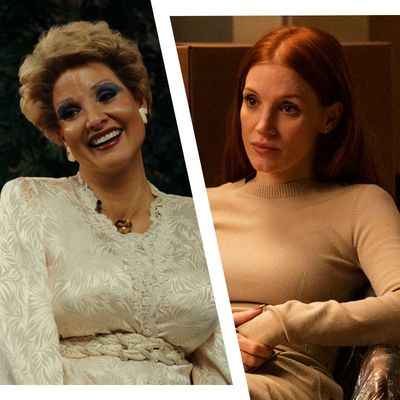
If you know anything about Jessica Chastain, it’s that she’s an actor who has red hair. Maybe you also know that she is not Bryce Dallas Howard, though a lot of people say they look similar (they don’t, really, but anyway). If you know one more thing about her, it’s probably that she went to Juilliard, because this tends to come up a lot. As someone who has seen most of Chastain’s filmography, it’s hard to know what else exactly to add to that pile. She’s worked with an impressive number of auteurs and accumulated numerous awards and nominations (including two Oscar noms), and has an undeniable level of technical expertise. She delivers every line like she’s trying to pass an acting intensive class, which almost always amounts to a performance that isn’t so much good or bad as it is “correct for the project,” even when the movie or show is more obviously good or bad.
Chastain’s versatility has made for a career that is hard to sum up into a type. While some actors seem to return to the same persona, she skips between a collection of them. Sometimes, as in her Oscar-nominated turn in Zero Dark Thirty, she plays type-A women in charge. Or, as in her recent film The Eyes of Tammy Faye, she embodies a form of campy, often southern-flavored femininity. Then there’s Scenes From a Marriage, which just concluded its run on HBO and serves to remind you she can do staid, naturalistic prestige (did you know she went to Juilliard?). These personas recur throughout her filmography with slight tweaks, as if some of her performances were reacting to the ones that came before, either doubling down on something that worked or pulling against it. In between credits, she appears on social media, posting inscrutable, staged happenings (there is no English-language word to describe these videos), often with famous friends, that present a person who is both accessible and unknowable. Indeed, if one is to understand Chastain’s work as a whole, it requires resolving all the contradictory impulses that she follows on-camera, large and small. To arrive at a grand unified theory of Jessica Chastain, if physics allows for such a possibility, one must consider a wide variety of her screen moments. And we are here to do just that.
The Tree of Life (2011)
Chastain’s on-camera career started with a smattering of TV roles (she was pregnant on Veronica Mars in 2004), then accelerated with a bunch of film roles — starting with 2008’s Jolene, in which she played an abused teenager; continuing through 2010 with The Debt, in which she’s a young Helen Mirren; and then arriving in 2011 with major roles in five different movies: Take Shelter, The Tree of Life, Coriolanus, Wilde Salomé (really a documentary about a stage performance she had given with Al Pacino in 2006), and Texas Killing Fields. Of those movies, The Tree of Life solidified one essential strain of the Chastain persona: the beatific young mom and wife.
Here, she brings out a sense of ethereal beneficence in her soothing voice-over and as she talks about “the way of nature and the way of grace,” really extending the pause after “nature” like she’s reciting a Shakespearean sonnet. (Classical-training vibes!) She adopts a pre-Raphaelite posture at the dinner table in a way that feels like she and Terrence Malick paged through Millais paintings together. And she gives a similar performance, though with more interior torment, in Take Shelter. If you needed someone to play ageless goodness in your movie, well, hello, 2011 Chastain was just waiting for your call.
The Help (2011)
If you’re breaking out in the movie industry with two roles as nearly saintly wives that prove just how good of a scene partner you can be, it helps to have a performance in which you chew through the scenery, spit it out, and chug it like it’s vintage Coke. In her first Oscar-nominated performance, Chastain goes hard into exaggerated lacquer and prop comedy. The Help’s an obvious movie, so the obvious choices work well enough.
Look at the way her hand slides down her torso before going “I know,” the jumping hand clasp over her face when Octavia Spencer agrees to work for her, and the way she starts downing the soda after giving that eerily big grin on “great.” It’s a big, garish explosion of arms and gestures and postures that’s too much, and I guess it’s supposed to be. It’s interesting that Chastain has been cast as so many southern belles (she grew up in Sacramento), but she is very good at the whole persona (she went to Juilliard).
Zero Dark Thirty (2012)
Most of the thesis of Zero Dark Thirty boils down to one still of Chastain looking intense in sunglasses: As she literally says in the dialogue, she is the motherfucker who found Osama bin Laden. Her character Maya was based on a real person but got sort of sanded down into a symbolic figure of a hypercompetent woman who gets the job done despite lacking the trust of the man above her. The movie is somewhat ambivalent about the CIA’s singular focus on killing bin Laden (the last shot of Chastain’s character crumbling without purpose after the mission ends counterbalances some of the action sequences) and still blinkered about the larger cruelty of the war on terror and the efficacy of torture. Anyway, it’s the movie where Chastain hones the badass-woman side of her screen persona, turning in a performance that’s all clenched jaw, hard stares, and defensive posture.
It’s a subtype of role that Chastain has embraced and sometimes seems to have trouble shaking, the way your parents warn you that if you make a face for too long it might stay that way (in this case, the face being made is 90 percent cheekbone). It’s a meld of availability — the dynamic roles for women in film too often reduce them to “strong female leads” — and taste: These roles often involve capital-A acting in order to telegraph traits like strength, badassery, and a blend of not giving a fuck with a lot of dialogue featuring the word “fuck.”
Miss Julie (2014)
Post–Zero Dark Thirty, Chastain got a little experimental, branching out into horror (with Mama) and doing a rom-dram with The Disappearance of Eleanor Rigby — memorable both for its Weinstein-mangled release and for getting Chastain and Isabelle Huppert in a movie together, a public friendship that continues to this day. She collaborated with another famed European actress in Miss Julie, an adaptation of the Strindberg play by Liv Ullmann (she of the original Scenes From a Marriage) in which Chastain gets to play psychosexual games with Colin Farrell.
You can see a bit of the famous “kiss my shoe” scene above, which Chastain delivers with the confidence of someone who already definitely did this in some scene-study class, before pulling back into a near-expressionless visage with all her lust trembling in her mouth. She loves to collaborate with actresses a generation above her, and she loves to act!
Interstellar (2014)
The meme of Matthew McConaughey crying endures, but you may not remember that it’s Jessica Chastain, as a character Christopher Nolan brilliantly named “Murph,” that’s making him cry. At first glance, you might assume that Nolan wanted Chastain for her poise and air of competence, and yes, she is a math genius in this, but it’s really the Tree of Life–variety essential goodness he uses here.
Enjoy the long, hard stare after “Hey, Dad … you son of a bitch …” Pathos that helps land its big, bonkers, “time travel by way of bookcases and the power of love” finale with actual emotional devastation.
A Most Violent Year (2014)
Ve. Ry. Disrespectful. The competence and intensity verge ever closer to camp.
Crimson Peak (2015)
Not to spoil the plot of Crimson Peak. Not to spoil the plot of Crimson Peak. Not to spoil the plot of Crimson Peak. BUT NOW THAT YOU’VE DECIDED TO KEEP READING: May we never forget that this movie reveals that Chastain and Tom Hiddleston (two of the palest people in existence) are in an incestuous relationship, and that when Mia Wasikowska (somehow paler) discovers it, Chastain stabs her and throws her off a balcony while going, in an overwrought British accent, “ThAHt’s delightful. I AHm.”
Chastain pulls from some of her more “serious” work (accents) along with her bevy of women-in-charge parts, curdled here into a mania. (In the next year’s Snow White and the Huntsman: Winter’s War, she’s doing fantasy again, but while Emily Blunt and Charlize got gowns, she got … braids.) Disrespectful, delightful — Chastain is really the best at delivering a put-down in an elaborate costume.
Miss Sloane (2016)
Here’s where we get to a bit of a breaking point in the whole hypercompetent badass-woman character Chastain has played a lot of: Miss Sloane is nonsense. It’s supposed to be a sort of feel-good thing about a high-powered lobbyist who games the gun lobby with faux-Sorkin dialogue, but it makes not a lick of sense and ends with this monologue where Chastain calls senators rats and “the real parasites on American democracy” (the movie’s politics are superficially liberal, but I did find the clip uploaded on YouTube with a bunch of MAGA hashtags).
Anyway, I admire the commitment to hard-T pronunciation (“download a file named earTHquaKe”), but there’s no there there with this character.
Molly’s Game (2017)
Sort of a readjustment back from Miss Sloane, given that she went from faux-Sorkin to the real thing, but the character’s still a bit of a mystery here. The movie tacks on some daddy issues to explain her, but feels more about Sorkin ruminating about what happens at 1 Oak than doing a character study. Chastain, again, delivers on the poise and pronunciation.
I went with the clip above primarily because she gets to say “humidor.” Her commitment to playing this kind of character kept going onward from here, extending into 2020’s Ava, a not-good movie that somehow became very popular on Netflix during the pandemic.
Woman Walks Ahead (2017)
In the midst of her “power woman in contemporary times” era, Chastain also branched out into historical projects that seem like potentially fruitful ideas on paper but didn’t quite pan out as hits. In 2017, she did both The Zookeeper’s Wife, about a Polish woman protecting her animals during the Nazi invasion, and Woman Walks Ahead, about a Swiss woman who befriended Sitting Bull. In both, she again really commits to her accents, which is a sign of dedication (Juilliard!), but maybe also too much dedication.
There’s a bit of “Meryl Streep as Isak Dinesen” cranked up a few more notches in the way she tells Sam Rockwell, “I’ve met you twoh minutes agoh and already you’ve accused me of being a spy and a liar.”
X-Men: Dark Phoenix (2019)
Chastain’s character is named Vuk, and during a climatic scene, she chokes out Sophie Turner and mutters, “Your emotions make you weak.”
I respect that she has never done a Marvel movie but has played Vuk. Long live Vuk.
Scenes From a Marriage (2021)
As we get up to the present, I’m less sure if we can hypothesize a grand theory of Chastain as much as identify the different strands of her go-to performance styles she samples for each role. For instance, in this HBO series, she’s playing a high-powered tech executive (see Miss Sloane) who happens to be in a relationship with Oscar Isaac (A Most Violent Year) in a remake of the prestigious original series that starred Liv Ullman (double check for Miss Julie). Note her scenes when she turns away from Isaac to hide some private angst (very Juilliard) and her cool relationship with her daughter (reverse Tree of Life). It’s all recursive!
The Eyes of Tammy Faye (2021)
Which is to say it’s also all just layers of performance! In The Eyes of Tammy Faye, a so-so biopic with a bewilderingly energetic central performance, Chastain dons prosthetics and tons of makeup (which did NOT damage her skin, to be clear) to play televangelist Tammy Faye Bakker. It’s all very lurid, but I think that by piling on layer over layer of artifice, Chastain arrives at a performance that ends up being quite moving. There’s a scene late in the movie where she re-creates a moment where the Bakkers have lost everything in a scandal and make a public plea for their innocence on TV. She decides to start singing a song, obviously the wrong move, but there’s something childish about it, as if all she knows is how to perform and so she has to keep performing, even when it would be better to be real.
The film has been a passion project of Chastain’s for “nearly a decade,” and it’s interesting to think about it simmering in the background as her career took off and as the roles she was being offered calcified into recurring types. Tammy Faye Bakker’s life has all the sordid events that make playing her obvious awards bait, but what made Chastain so latch on to the role? Does she see something of herself in a woman too quickly pigeonholed as all artifice and no core, or did she just really want to sing and do an accent? The performance invites you to speculate and sympathize, even if the movie doesn’t quite let you into it all.
Instagram (updating constantly)
Anyway, that’s also the vibe I get from Chastain’s most extended performance, which happens here. She loves to post clips with her co-stars (here, she and Oscar Isaac slip into vaguely Italian accents in Venice), which sometimes involve games with rules I don’t understand (what exactly is Sebastian Stan’s goal here?) and her joking that her assistants and video editors do not like her (I hope her assistant is in on this joke? And here, to prove an old editor wrong, she makes a cup of tea). In what I feel is the Ur-video, above, she recites Shakespeare on a camel in the desert (don’t make me mention where she went to school again). It’s a public persona that feels like an attempt to get in on “so relatable” mid-2010s celebrity culture without giving away much of any personality. It extends into her work inasmuch as it felt akin to her appearance in It: Chapter Two inasmuch as people kept talking about her looking like Sophia Lillis, and to her collaboration with Xavier Dolan that never made it out of the editing room in The Death and Life of John F. Donovan. She once Instagrammed a Photoshop of Sebastian Stan and Dolan together for his birthday; Naomi Watts liked the post.
After her big 2021 projects, Chastain ostensibly has another film coming out, which she produced and which feels directly born from this social-media presence: The 355, about badass women spies from around the world. If The Eyes of Tammy Faye was one kind of passion project, this feels like a different kind of personal desire: to develop some IP. From the trailer, the movie looks as if Chastain spent her time coaching Lupita Nyong’o, Penélope Cruz, Diane Kruger, and Fan Bingbing to all play her brand of badass woman. It’s not particularly emotionally engaged and it feels calculated as hell, but I bet Chastain gives exactly the performance that movie deserves.



